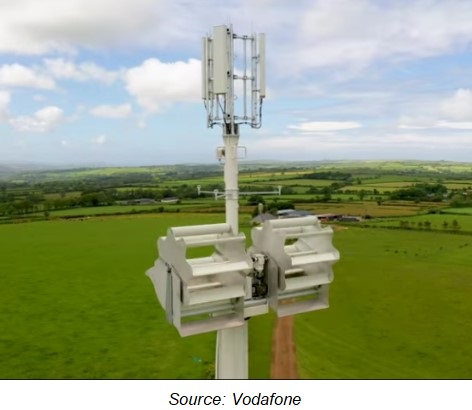Supporting Vodafone’s target of net zero carbon U.K. operations by 2027, the MNO has deployed the U.K.’s first live wind- and solar-powered mobile phone mast in Wales, which provides 4G coverage. Cell towers like this one, which incorporate a wind turbine, solar panels and on-site battery storage, will provide coverage in the U.K.’s most remote and inaccessible locations – helping the industry achieve its goal of 95 percent U.K. landmass coverage by 2025.
A partnership between wind turbine technology OEM Crossflow Energy and mobile infrastructure partner Cornerstone, the trial will take place in the village of Eglwyswrw over the next two years. Data gathered will help Vodafone optimize the technology and determine which sites are most suitable for “self-powering” cell towers.
The “self-powering” cell tower incorporates a Crossflow Energy wind turbine, which can generate power even in light winds. It is also quiet, making it viable for protected Areas of Outstanding Natural Beauty, many of which do not have an existing electricity connection.
Vodafone Sets Carbon Reduction Goals
In June 2021, Vodafone announced its plan to eliminate all carbon emissions from its operations and the electricity it purchases across 21 countries by 2030 and by 2027 in the U.K. In announcing the ambitious new carbon reduction targets, Andrea Donà, Network and Development Director, noted that the process of connecting 16 million people uses 560 Gigawatt hours of electricity per year, which has a big impact on the environment that the company wants to change.
One month later, Vodafone announced that every area of its business in the U.K. – including its network, data centers, retail stores and offices – was 100 percent powered by electricity from renewable sources, such as wind, solar and hydro.
“Switching to 100 percent renewable electricity, in July 2021, has had a huge impact: we’ve reduced carbon emissions from our U.K. operations by 55 percent from the previous year, despite significant growth in our voice and data traffic,” said Vodafone’s U.K. CEO Ahmed Essam as he outlined the progress the company has made towards net zero carbon emissions.
Last September, Vodafone and Ericsson completed the first deployment of a 5G radio that decreased energy consumption by a daily average of 43 percent, and as much as 55 percent at off-peak times.
In May of this year, Vodafone signed a 10-year power agreement with three new solar farms in Lincolnshire, Worcestershire and Nottinghamshire, securing their development and bringing additional renewable power provision to the U.K. grid. The deal also supports the U.K. government’s ambition to focus on home-grown, clean and more affordable energy to boost long-term energy independence and security.
By J. Sharpe Smith, Inside Towers Technology Editor




Reader Interactions